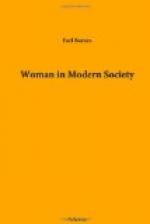Meantime the old arguments against woman suffrage are too outworn to need serious attention. In the past decades our civilization has become so complex, with so many groups carrying on differentiated functions, that even if we had not the millions of educated, property-owning, wage-earning, voting women that now fill our public life, the old arguments would still be obsolete. The issues of life are no longer primarily military, and but a fraction of men voters is capable of meeting modern requirements as policemen and soldiers; in time of crisis, all men would be called into the reserves; but in such periods women have always fought in the breach, from Carthage to Paris. Still, in modern warfare, those who guard the rear and furnish supplies are as necessary as those who go to the front.
It has also long been recognized that women who rear finest sons and daughters must sometimes turn away from the cradle to refresh their lives with the touch of other interests. It has also been demonstrated a thousand times over that women do not incite the lawless element to riot about the polls; but that, instead, their presence tends to remove the polling-place from the saloon and make it safer for men to go there on election-day. The plea that women would introduce a new element of sex into politics, thereby confounding its real issues, is certainly not well grounded. Sex has always played a great part in politics, as it has in all the vital affairs of life. In the open competitions of education, business or politics, sex ceases to be as significant as it is in the drawing-room.
Nor do thoughtful people imagine to-day that if women participated in political life they would suddenly bring about a reign of universal peace and righteousness. It has taken many centuries for men to learn to play the game of politics indifferently well as they do. The first effect of woman’s participation would probably be to lower the efficiency of the electorate in some directions; but they are starting much farther along than men began, and they would learn more rapidly than men have learned.
It is often claimed that women do not want to vote; and, of course, there are many who do not care to assume such arduous and often difficult duties, if they can avoid it. The same holds true of many intelligent, but selfish men who desire the advantages of good government without its burdens. All such must be urged to do their duty to the state. Those who have vision and a large sense of duty can be trusted to do their fair part in caring for the public welfare. Those who wish to enjoy the benefits of peace and settled government, participating in the advantages of education, engaging in business, and having their persons and property protected, without sharing the burdens of government, should be forced to play their part.




